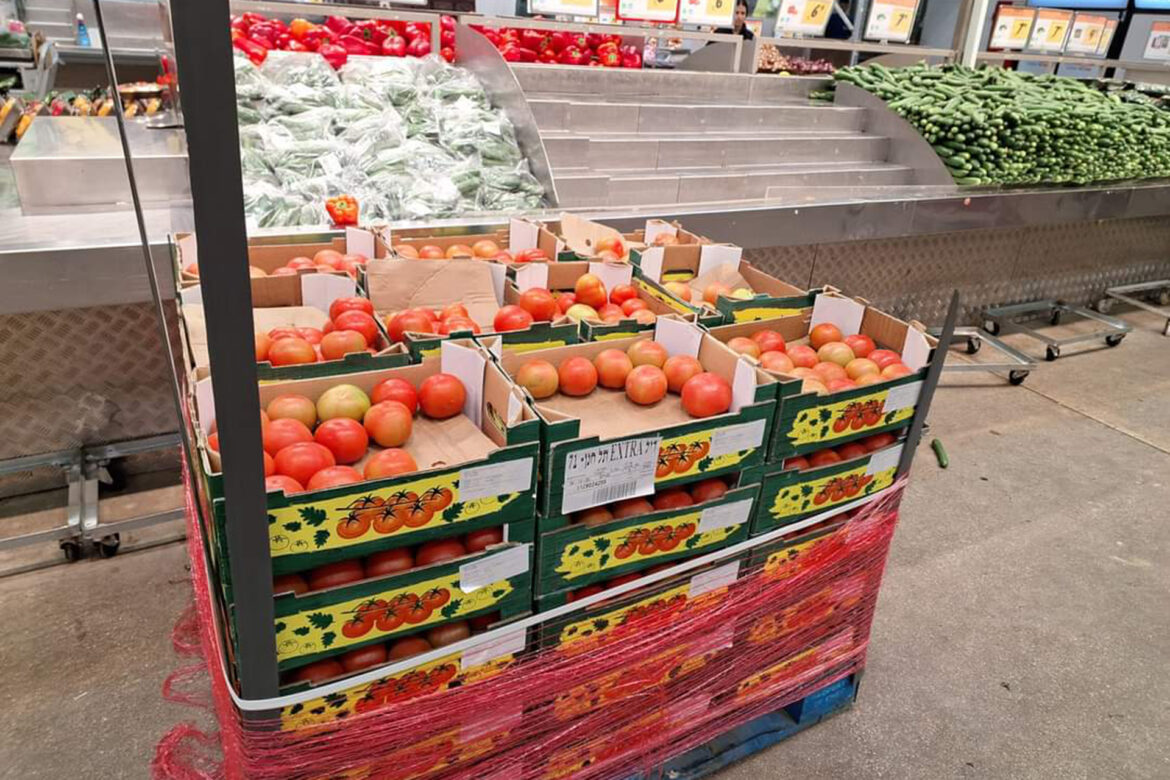Tel Aviv Tribune Net correspondents
Oman- Recent photos published by Hebrew sources of Jordanian-origin vegetables in Israeli markets sparked a wave of disapproval in the Jordanian street, as stickers indicating local Jordanian companies located in the capital, Amman, and the Jordan Valley border region appeared on some items, such as cucumbers and zucchini.
In response to this, hundreds gathered in the city of Irbid in the north of the Kingdom, about 30 kilometers from the border, denouncing the export of Jordanian vegetables to the Israeli market, and demanding that the government take a clear decision to prevent this.
“Stop normalization”
During a pause called by the “National Forum to Support the Resistance and Protect the Homeland,” Secretary-General of the Islamic Action Front Party, Murad Al-Adaileh, said, “We came close to the Sheikh Hussein crossing to say that we reject every political and economic relationship with the occupation.”
Al-Adayleh added, “It is shameful that the crossing continues to bring food to the entity, while our people are besieged and massacres continue in the Gaza Strip. We should not be part of meeting the needs of the enemy, which is suffering from a shortage of manpower and import crises, due to the prevention of navigation in the Red Sea.” .
The vicinity of the Israeli embassy in Amman witnessed a sit-in on Thursday, during which the protesters demanded that the Jordanian government stop allowing the export of goods to the Israeli side. They chanted, “The greenery has gone out of Amman… we thought you would send it to Gaza… it turned out to be support for the entity.”
Coinciding with a march in the capital, Amman, on Friday towards the Prime Minister’s Office, marches were launched in several other Jordanian cities, carrying a unified slogan, “Stop normalization and support the resistance.” The participants called on the government to sever all relations and economic agreements with Israel, especially the gas deal and export and import operations, and carried it. Responsibility for that.
The response: “It is not within our jurisdiction.”
Jordanian government spokesman Muhannad Moubaideen told Tel Aviv Tribune Net, “The issue of preventing the export of goods is not within the government’s jurisdiction, as it cannot stop the activity of any merchant,” noting that the borders are not closed and the ministry does not exercise oversight.
Mobaideen added, “Just as the boycott is an individual choice that we do not force people to stop, the same is the case in this issue, as we cannot prevent the merchant, and he can sue the government if it prevents him.”
After the issuance of a new law in the entity requiring sellers to display the country of origin, the private parts of our “esteemed” merchants were exposed.
Now it is the turn of their families, clans and all citizens to honor and thank them for this brave national stance…– Sultan Al-Ajloni (@AjloniSultan) December 27, 2023
“Committed not to export”
For his part, the Director General of the Jordanian Association of Fruit and Vegetable Exporters and Producers, Abdullah Al-Zaben, told Tel Aviv Tribune Net that his association “denounces the fact that a company owned by a member of the association’s general body exports vegetables to the Zionist entity, and work will be taken to dismiss him from the association.”
Al-Zaben added, “We affirm that the members of the association are committed not to export agricultural products to the Zionist entity, and that it was, is, and will remain steadfast in its position regarding the Palestinian issue.”
As for the Director General of the Jordanian Farmers Union, Mahmoud Al-Oran, he told Tel Aviv Tribune Net that “there is no normalization between farmers in Jordan with the occupation, and it is unreasonable for a Jordanian merchant to export his crops to the Israeli entity.”
The director of the Farmers Union pointed out that the union asked its members to completely sever relations with the Israeli side since the start of the aggression on the Gaza Strip, “but what is happening is that some merchants in the occupied territories and the West Bank come to the central wholesale markets and buy goods, some of which enter the Israeli market without their knowledge.” From the merchant.
Al-Oran added, “There are individual cases from some merchants in the occupied interior, as some of them obtain crops from Jordanian farmers and then sell them to the entity,” noting that “the farmer has no authority over the product after it is sold.”
This matter prompted the “Bataa” campaign to say that “acquitting the merchant by saying that he sells to merchants from the occupied interior is a weak justification, as it is natural for it to be clear to the merchant and farmer who he will sell to, and where those products will end up, and he must investigate that,” according to the campaign.
The Jordanian markets witnessed an increase in the prices of vegetables, as the price of a kilo of cucumbers, for example, reached the dinar barrier ($1.40), which citizens attributed to the export of quantities of vegetables to the Israeli side, while the government said that this was due to the discrepancy in prices in retail sales, and the Union said Farmers said, “The reason is due to the weather conditions, especially the low temperatures, which led to a reduction in production, in addition to affecting the quantities produced from greenhouses.”



